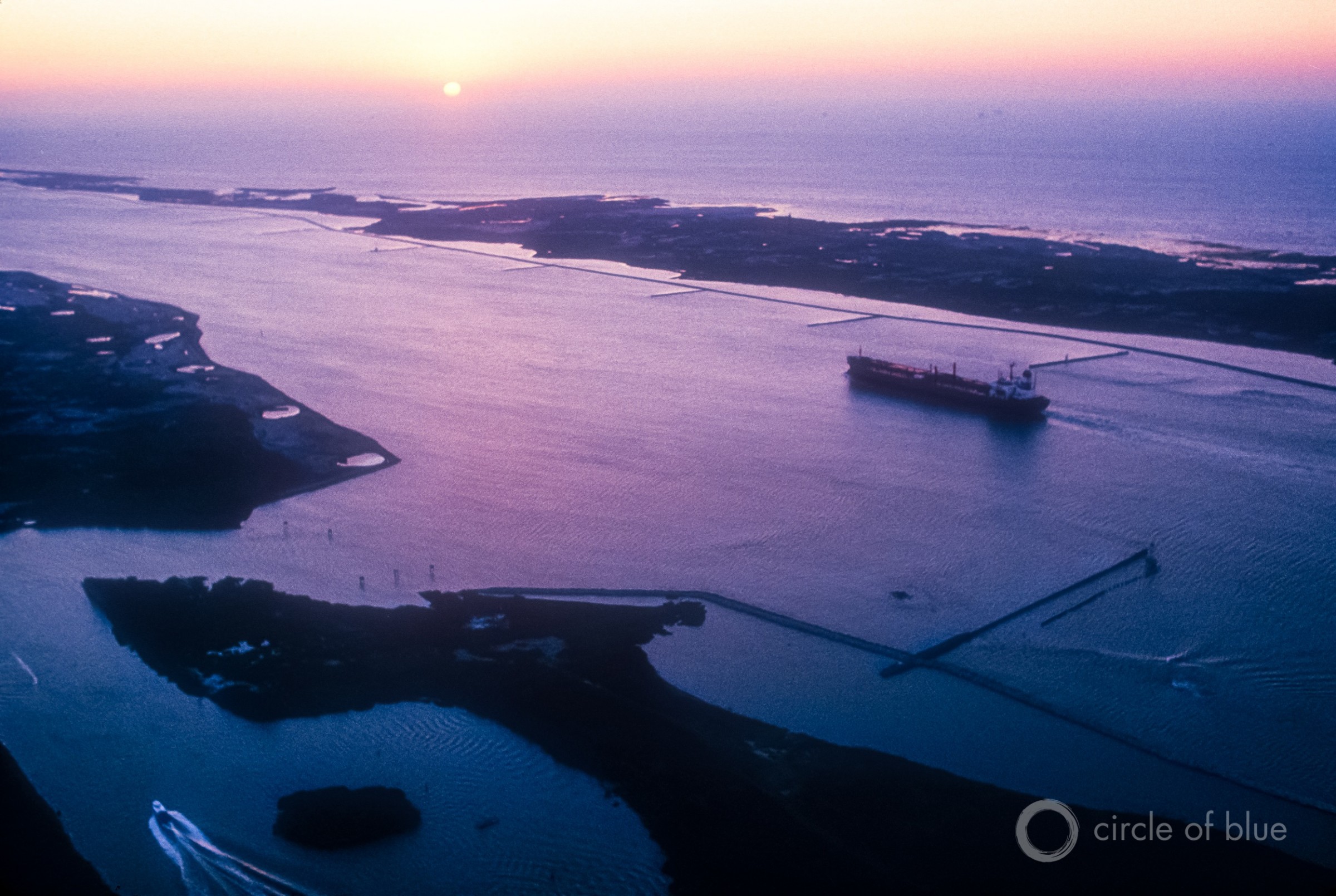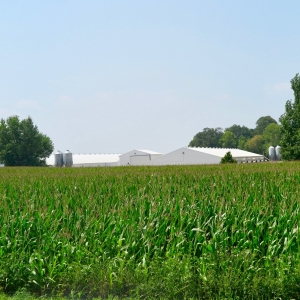The Stream, August 30, 2023: Depleted Rivers Hamper Global Trade

Cargo ships transit the Mississippi River delta. Photo © J. Carl Ganter/Circle of Blue
YOUR GLOBAL RUNDOWN
- Officials in Chile predict more than $1 billion in agricultural losses after dangerous rains flooded irrigation canals, farmland, and rivers.
- Cocoa growers in Ivory Coast, the world’s top exporter of the crop, remain optimistic that healthy soils will support strong harvests despite recent below-average rains.
- Blue-green algae and non-native species are debilitating Northern Ireland’s Lough Neagh, the largest lake in the British Isles.
- Representatives from nearly 200 countries established a new global biodiversity fund last week, aiming to “put nature on a path to recovery by 2030.”
Ship traffic on some of the most important rivers for global trade is slowing due to low water levels brought on by drought and warming.
“These kinds of issues, overall, are becoming more frequent. Dryness in Panama, low levels in the Mississippi. Low levels in the Rhine. That’s of concern to anyone that has interests in global trade.” — Jon Davis, a meteorologist with Everstream Analytics.
Key rivers that facilitate global trade — including the Mississippi and Rhine, as well as the Panama Canal — continue to reckon with low water levels brought on by drought and warming, the New York Times reports. As a result, officials are approving the travel of fewer ships, often with less cargo, through major canals and ports.
These droughts are often attributed or “aggravated by the burning of fossil fuels,” according to the Times, and the shipping industry burns “heavy fuel oil, which accounts for roughly 3 percent of global greenhouse gas emissions.”
Last year, the World Meteorological Organization showed that “economic damage from droughts jumped by 63% in 2021 compared with the 20-year average,” the World Economic Forum reported.
Experts also predict that the effects of El Niño, which “tend to peak during December,” NBC News reports, will further exacerbate the problem, slowing shipments and creating logjams.
— Christian Thorsberg, Interim Stream Editor
Recent WaterNews from Circle of Blue
- Water Migrants: Crisis in the Mediterranean Episode 2 — Countless thousands are journeying across the Mediterranean Sea, endangering their lives in search of refuge in Europe.
- ‘Water Is Us’: New Book Offers Blueprint for Sustainable Water Future — The Three Ages of Water looks back at history to write a prescription for tomorrow.
The Lead
Lough Neagh, the British Isles’ largest lake and the 33rd largest in Europe, is “dying in plain sight,” campaigners in Northern Ireland told The Guardian. Current levels of toxic blue-green algae are the highest in the last half century. Nearly half of Northern Ireland’s drinking water today is sourced from the lough.
Along with the algae, water temperatures have increased one degree Celsius since 1995, a result of several factors. Slurry, farm runoff, and human sewage take most of the blame for the blooms. But academic research also attributes the rise to non-native zebra mussels and climate change. Surrounding the lough, an expansive wetland ecosystem is under multiple legal protections, further angering activists and locals who say that Lough Neagh’s current state is due to neglectful regulators and exploitation.
Lough Neagh’s deterioration coincides with the biodiversity crisis — according to Queen’s University Belfast researchers, “the number of migratory winter birds had dropped by nearly 80% in a decade.” Certain insect and snail species inhabiting the lough beds have also sharply declined.
This Week’s Top Water Stories, Told In Numbers
100
Number of Chile’s municipalities in which a state of catastrophe was declared last week amidst dangerously heavy rains, Reuters reports. The storms swept primarily through the country’s rural and agricultural hubs, overrunning irrigation channels, causing rivers to overflow, and drowning orchards in Chile’s south-central regions. In all, officials estimated more than $1 billion in agricultural losses.
185
Number of countries represented and participating in the newly formed Global Biodiversity Framework Fund, Mongabay reports. The fund, ratified at the Global Environmental Facility’s seventh assembly in Vancouver last week, represents a tangible step following December’s COP15 biodiversity conference, held in Montreal. The goal, per Mongabay, is to “help halt and reverse biodiversity loss and put nature on a path to recovery by 2030.” The first two contributions were also announced: Canada pledged $146.8 million (USD), and the UK, $12.58 million (USD).
On the Radar
The quality of the world’s cocoa supply will be revealed this autumn, as growers in the Ivory Coast, the global top exporter, reckon with below-average rainfall ahead of their busiest harvesting months, September and October. Still, there is cause for optimism: Despite the lower-than-average rain, healthy soils have the regions poised for a strong crop. Now in their wet season, the growers told Reuters that as long as September brings lots of rain and sun, their yields should be bountiful.
More Water News
Times Square: The streets of New York’s Times Square and the city’s busiest subway station were flooded when a 127-year-old water main broke overnight, ABC News reports.
Hurricane Idalia: Officials expect a “life-threatening storm surge” as Hurricane Idalia continues to strengthen as it moves toward Florida, where evacuation orders are in effect at the time of writing, CNN reports.
Christian Thorsberg is an environmental writer from Chicago. He is passionate about climate and cultural phenomena that often appear slow or invisible, and he examines these themes in his journalism, poetry, and fiction.






Leave a Reply
Want to join the discussion?Feel free to contribute!